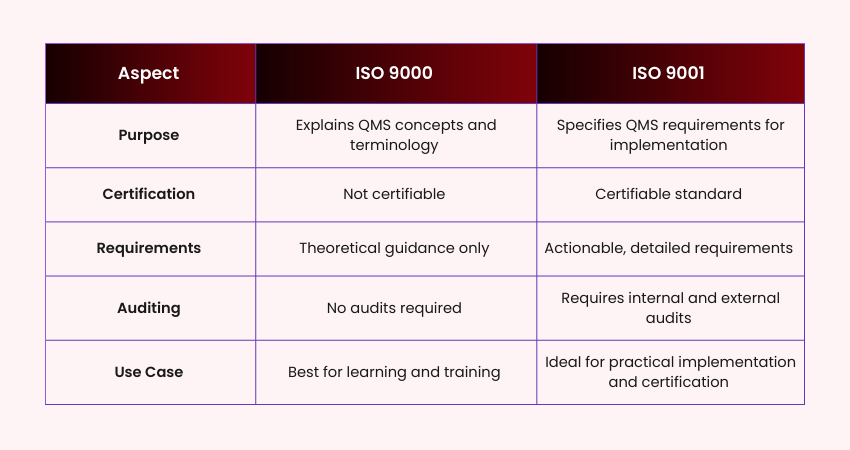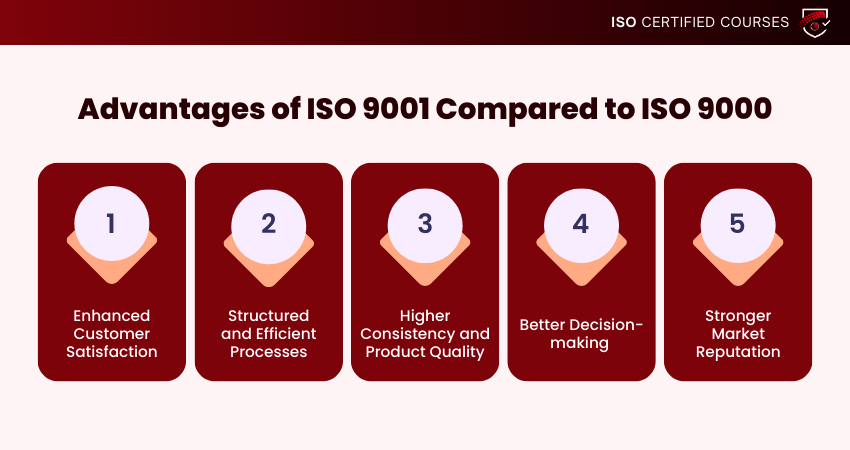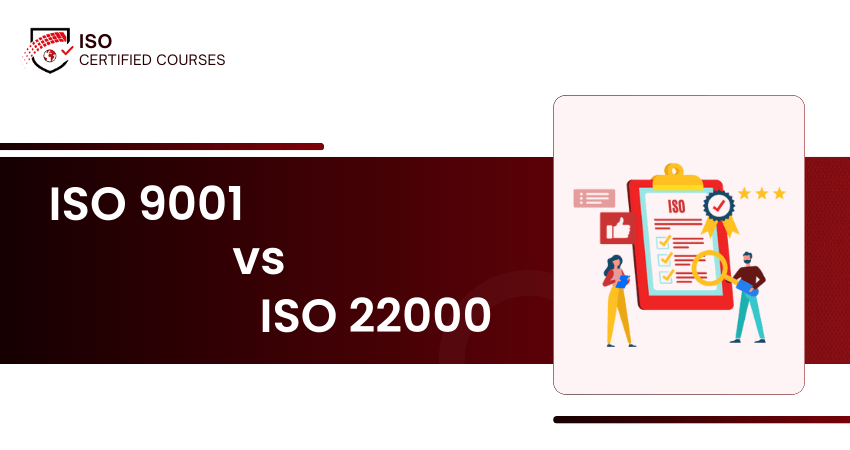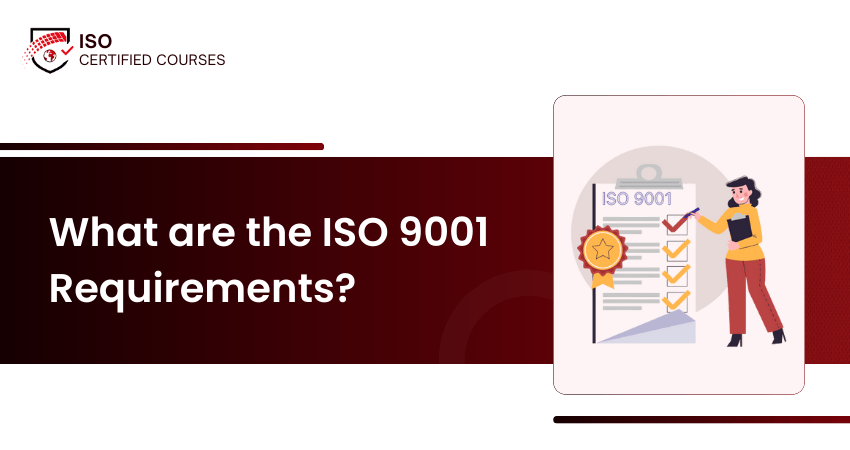Here's the truth: navigating ISO standards feels like decoding a secret language. ISO 9000 or ISO 9001? Are they the same? Do you need both? If you’ve ever scratched your head at these terms, you’re not alone.
While they sound alike, they serve very different purposes in your Quality Management journey. One helps you understand, the other helps you do. Stick around as we explore ISO 9000 vs ISO 9001 and help you decide which one your business really needs. Let’s make the right decision together?
Table of Contents
1) What is ISO 9000?
2) What is ISO 9001?
3) Difference Between ISO 9000 vs ISO 9001
4) What Does ISO Certified Mean?
5) What are the Advantages of ISO 9001 Compared to ISO 9000?
6) Conclusion
What is ISO 9000?
The ISO 9000 series of Quality Management Standards is widely utilised in a variety of industries, including manufacturing, construction, and services. It gives its subgroups a general framework by outlining the principles and jargon associated with Quality Management Systems (QMS).
1) Customer Orientation
2) Strong Leadership
3) People Involvement
4) Process-driven Approach
5) Continuous Improvement
6) Data-driven Decisions
7) Effective Relationship Management
In short, ISO 9000 sets the foundation for understanding Quality Management and supports the implementation of effective quality practices.
What is ISO 9001?
ISO 9001 is a worldwide standard for Quality Management Systems (QMS) utilised in a variety of industries, including manufacturing, construction, healthcare, and IT services. It outlines the precise conditions that businesses must fulfil to continuously provide goods and services that meet both legal and consumer needs.
ISO 9001 focuses on the practical implementation of Quality Management and is based on seven core principles:
1) Consistently deliver compliant products and services
2) Enhance customer satisfaction through process improvement
3) Ensure ongoing regulatory and statutory compliance
Organisations that achieve ISO 9001 certification demonstrate quality, reliability, and global competitiveness.
Difference Between ISO 9000 vs ISO 9001
Although ISO 9000 and ISO 9001 belong to the same ISO 9000 family of standards, they serve different purposes. Here’s a detailed brAAeakdown:

1) Scope and Purpose
ISO 9000 defines the fundamental concepts, principles, and terminology related to Quality Management Systems. It serves as a reference guide to help organisations and professionals understand how Quality Management works, and the key terms used within the framework.
ISO 9001, on the other hand, outlines the specific requirements that organisations must meet to establish, implement, maintain, and improve their QMS. It focuses on achieving consistent product and service quality while enhancing customer satisfaction. By following ISO 9001, organisations can ensure their processes are efficient, standardised, and aligned with global quality benchmarks.
Let your processes speak for your brand – Register for ISO 9001 Lead Auditor Course today!
2) Certification
ISO 9000 functions solely as a guideline and is not intended for certification. It helps organisations understand Quality Management principles and concepts but does not evaluate or verify compliance with any specific standards.
ISO 9001, on the other hand, is a certifiable standard. Organisations can obtain ISO 9001 certification to showcase their commitment to quality, build customer trust, and align their processes with internationally recognised quality benchmarks, strengthening credibility and competitiveness in the market.
3) Specific Requirements
ISO 9000 outlines fundamental concepts and principles of Quality Management but does not provide detailed instructions or mandatory criteria. In contrast, ISO 9001 sets forth specific, actionable requirements for establishing an effective Quality Management system. It emphasises key elements such as risk-based thinking, ensuring customer focus, leadership accountability, performance evaluation, and continual improvement.
These requirements help organisations systematically manage quality processes, reduce risks, and enhance customer satisfaction. While ISO 9000 serves as a conceptual guide, ISO 9001 acts as a practical framework for implementing and maintaining a robust, structured Quality Management System.
4) Auditing
ISO 9000 acts as a reference standard that explains the principles and terminology of Quality Management Systems, so it does not require audits since it isn’t meant for certification. Organisations use it mainly for understanding concepts and training purposes.
On the other hand, ISO 9001 is a certifiable standard and mandates regular internal and external audits. Internal audits help organisations assess their quality processes, while external audits by accredited bodies ensure compliance with ISO 9001 requirements. These audits are essential for achieving and maintaining certification, driving continuous improvement, and ensuring consistent product and service quality.
5) Applicability
ISO 9000 is best suited for organisations and professionals seeking a theoretical understanding of Quality Management Systems (QMS). It serves as a foundation for learning, making it especially useful for training, knowledge-building, and understanding the concepts and terminology behind Quality Management.
ISO 9001, on the other hand, is applicable to all types of organisations, large or small, across any industry. Its focus is on the practical implementation of a QMS and achieving certification. By meeting ISO 9001 requirements, organisations can enhance credibility, improve efficiency, and demonstrate their commitment to delivering quality products and services consistently.
What Does ISO Certified Mean?
Being ISO certified means that an organisation has met the standards set by the International Organisation for Standardization (ISO). Certification is usually granted after a successful audit by an external body.
It confirms that the company consistently follows internationally recognised best practices in its management systems, such as quality, safety, or environmental performance. ISO certification helps build trust with customers, stakeholders, and partners by showing a commitment to continuous improvement, reliability, and compliance with global standards.
Want loyal customers and efficient processes? ISO 9001 Lead Implementer Certification paves your way!
What are the Advantages of ISO 9001 Compared to ISO 9000?
While ISO 9000 lays the foundation by defining the principles and terminology of Quality Management, ISO 9001 goes a step further by providing a detailed framework that organisations can implement and get certified for. Here are some key advantages of ISO 9001:

1) Enhanced Customer Satisfaction: ISO 9001 places a strong focus on meeting customer requirements and exceeding expectations. By adopting its principles, organisations can better understand customer needs, address feedback effectively, and improve overall customer satisfaction and loyalty.
2) Structured and Efficient Processes: ISO 9001 requires organisations to define, document, and manage their processes. This results in more efficient operations, reduced errors, and smoother workflows. It also supports a cycle of continuous improvement that boosts overall performance.
3) Higher Consistency and Product/Service Quality: Through standardised procedures and clear quality control measures, ISO 9001 helps organisations deliver consistent, reliable results. This reduces variability, minimises defects, and ensures that quality standards are maintained across all operations.
4) Better Decision-making Through Data: ISO 9001 encourages a fact-based approach to decision-making. By tracking performance metrics and using audit findings, organisations can identify trends, uncover inefficiencies, and implement informed improvements based on solid data.
5) Stronger Market Reputation and Competitiveness: Achieving ISO 9001 certification signals to clients, partners, and regulators that the organisation is committed to quality. This not only builds trust but also provides a competitive edge in tenders, partnerships, and global markets where certification is often a prerequisite.
Conclusion
ISO 9000 and ISO 9001 serve different purposes. ISO 9000 explains Quality Management principles, while ISO 9001 provides specific, certifiable requirements for implementing them. For organisations aiming to improve processes and gain certification, ISO 9001 is the better choice. Use ISO 9000 for understanding the basics but choose ISO 9001 to drive real quality improvements.
Don’t just say you are quality-driven, prove it with ISO 9001 Certification – Start now!
Search Smarter
Quickly search through our blog content for what interests you








































